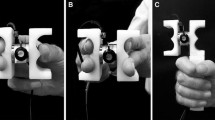Abstract.
The effects of predictability of load magnitude on anticipatory and triggered grip-force adjustments were studied as nine normal subjects used a precision grip to lift, hold, and replace an instrumented test object. Experience with a predictable stimulus has been shown to enhance magnitude scaling of triggered postural responses to different amplitudes of perturbations. However, this phenomenon, known as a central-set effect, has not been tested systematically for grip-force responses in the hand. In our study, predictability was manipulated by applying load perturbations of different magnitudes to the test object under conditions in which the upcoming load magnitude was presented repeatedly or under conditions in which the load magnitudes were presented randomly, each with two different pre-load grip conditions (unconstrained and constrained). In constrained conditions, initial grip forces were maintained near the minimum level necessary to prevent pre-loaded object slippage, while in unconstrained conditions, no initial grip force restrictions were imposed. The effect of predictable (blocked) and unpredictable (random) load presentations on scaling of anticipatory and triggered grip responses was tested by comparing the slopes of linear regressions between the imposed load and grip response magnitude. Anticipatory and triggered grip force responses were scaled to load magnitude in all conditions. However, regardless of pre-load grip force constraint, the gains (slopes) of grip responses relative to load magnitudes were greater when the magnitude of the upcoming load was predictable than when the load increase was unpredictable. In addition, a central-set effect was evidenced by the fewer number of drop trials in the predictable relative to unpredictable load conditions. Pre-load grip forces showed the greatest set effects. However, grip responses showed larger set effects, based on prediction, when pre-load grip force was constrained to lower levels. These results suggest that anticipatory processes pertaining to load magnitude permit the response gain of both voluntary and triggered rapid grip force adjustments to be set, at least partially, prior to perturbation onset. Comparison of anticipatory set effects for reactive torque and lower extremity EMG postural responses triggered by surface translation perturbations suggests a more general rule governing anticipatory processes.
Similar content being viewed by others
Author information
Authors and Affiliations
Additional information
Electronic Publication
Rights and permissions
About this article
Cite this article
Winstein, C., Horak, F. & Fisher, B. Influence of central set on anticipatory and triggered grip-force adjustments. Exp Brain Res 130, 298–308 (2000). https://doi.org/10.1007/s002219900248
Received:
Accepted:
Published:
Issue Date:
DOI: https://doi.org/10.1007/s002219900248




